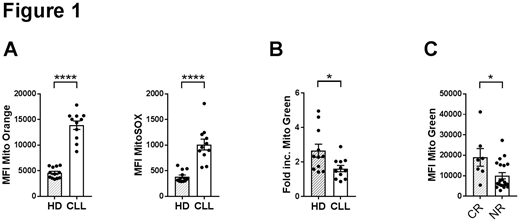Abstract
Background
In chronic lymphocytic leukemia (CLL), acquired T cell dysfunction impedes development of effective immunotherapeutic strategies through yet unresolved mechanisms. As an intricate relationship exists between cellular metabolism and T cell function, we hypothesized that the interaction of T cells with CLL cells leads to metabolic deregulation, resulting in T cell dysfunction. We have indeed recently shown impaired induction of glycolysis upon stimulation in CLL patient-derived T cells (Siska et al., 2016). Whether metabolic alterations are already present prior to activation and to what extent CLL cells contribute to impaired metabolic fitness of T cells is unknown. Furthermore, the clinical relevance of impaired metabolic fitness of CD8 T cells in CLL is still elusive.
Methods
CLL Patients were selected for CLL treatment naivety, and a white blood cell count greater than 20×109 cells/L. Age-matched healthy donors (HD) were used as controls. CAR T cell infusion products were generated from relapsed/refractory (R/R) CLL patients enrolled in two clinical trials of single-agent CTL019 therapy at the University of Pennsylvania (registered at clinicaltrials.gov; NCT01029366, and NCT01747486). T cells were analyzed either directly ex vivo, or after culture in the presence or absence of CD3 and CD28 antibodies by flow cytometry or XF96 Seahorse.
Results
Following stimulation, CD8+ T cells from CLL patients displayed reduced expression of activation markers, and showed reduced degranulation, while PD1 expression was higher. This was accompanied by reduced surface expression of the glucose transporter GLUT1, and reduced glucose uptake despite proficient glucose availability. Impaired glucose uptake by T cells seemed mediated by CLL cells as this was fully restored by depleting CLL cells prior to activation. This phenomenon is likely to be mediated by a soluble factor produced by CLL cells since reduced glucose uptake was still evident after physical separation of T cells and CLL cells in transwell experiments.
Because mitochondrial metabolism is instrumental to engage the first steps of glycolysis upon T cell stimulation (van der Windt et al. 2013), and mitochondrial reactive oxygen species (ROS) promote glucose uptake by promoting Glut1 expression (Liemburg-Apers et al. 2015), we next focused on mitochondrial function. We found that ex vivo CLL-derived CD8+ T cells displayed increased basal respiration (measured by O2 consumption rate, an indicator of oxidative phosphorylation), which was accompanied by an increased mitochondrial membrane potential and elevated mitochondrial ROS produced by CLL-derived CD8+ T cells (Fig. 1A). Spare respiratory capacity (SRC) is the extra mitochondrial capacity available in a cell to produce energy under conditions of increased work or stress such as T cell activation. SRC was reduced in ex vivo CLL-derived CD8+ T cells, indicating a lower ability to deal with enhanced bio-energetic demand. While total ex vivo CLL-derived CD8+ T cells showed similar mitochondrial mass compared to HD, antigen-experienced CLL-derived CD8+ T cells displayed reduced mitochondrial mass compared to HD. This latter coincided with decreased levels of PGC-1α, the master regulator of mitochondrial function and biogenesis, and its target anti-oxidant SOD2. Consistent with these data, reduced mitochondrial biogenesis occurred in T cells derived from CLL patients upon T cell stimulation (Fig. 1B). The clinical significance of these findings was studied by measuring mitochondrial mass in CD19-directed chimeric antigen receptor (CAR) CD8+ T cells within the infusion product of R/R CLL patients included in the CAR T cell trial. Subjects with a complete response had increased mitochondrial mass compared to non-responders (Fig. 1C). Also, a clear positive correlation was found between mitochondrial mass and T cell persistence as well as with memory T cells that were negative for exhaustion markers.
Conclusion
This is the first report describing a skewed mitochondrial metabolic profile in CLL CD8+ T cells prior to stimulation, which is maintained after stimulation and is then accompanied by impaired glucose uptake. Decreased mitochondrial fitness correlates with impaired CAR-T cell persistence and poor responses. Therefore, boosting mitochondrial biogenesis in T cells in CLL might improve the efficacy of CAR-T cell therapy and other emerging cellular immunotherapies.
Fraietta:Novartis: Patents & Royalties: WO/2015/157252, WO/2016/164580, WO/2017/049166. Eldering:Celgene: Research Funding. Levin:Celgene: Membership on an entity's Board of Directors or advisory committees; Janssen: Membership on an entity's Board of Directors or advisory committees. Rathmell:Calithera: Research Funding. June:Tmunity Therapeutics: Equity Ownership, Membership on an entity's Board of Directors or advisory committees, Patents & Royalties, Research Funding; Novartis Pharmaceutical Corporation: Patents & Royalties, Research Funding; Celldex: Consultancy, Membership on an entity's Board of Directors or advisory committees; Immune Design: Membership on an entity's Board of Directors or advisory committees; Tmunity Therapeutics: Equity Ownership, Membership on an entity's Board of Directors or advisory committees, Patents & Royalties, Research Funding; Immune Design: Membership on an entity's Board of Directors or advisory committees; Novartis Pharmaceutical Corporation: Patents & Royalties, Research Funding. Porter:Genentech: Other: Spouse employment; Novartis: Other: Advisory board, Patents & Royalties, Research Funding; Kite Pharma: Other: Advisory board. Melenhorst:Novartis: Patents & Royalties, Research Funding; Incyte: Research Funding; Tmunity: Research Funding; Shanghai UNICAR Therapy, Inc: Consultancy; CASI Pharmaceuticals: Consultancy. Kater:Janssen: Membership on an entity's Board of Directors or advisory committees, Research Funding; Roche/Genentech: Membership on an entity's Board of Directors or advisory committees, Research Funding; Celgene: Research Funding; Acerta: Membership on an entity's Board of Directors or advisory committees, Research Funding; Abbvie: Membership on an entity's Board of Directors or advisory committees, Research Funding.
Author notes
Asterisk with author names denotes non-ASH members.


This feature is available to Subscribers Only
Sign In or Create an Account Close Modal